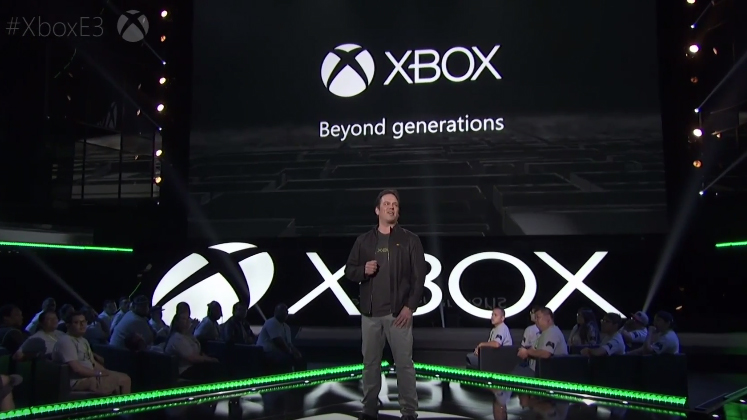Microsoft's grand PC-Xbox vision is finally coming together
Playing the long game

At E3 2016, Phil Spencer was Santa Claus in a video game t-shirt, taking the stage to tell the Microsoft faithful what they're going to want come Christmas. His appearance in an Xbox t-shirt might seem self-congratulatory from the head of Xbox, but he's got plenty to celebrate.
Spencer is the man that declared Xbox One's focus on entertainment to be a poor choice, and that from now on Microsoft would be concentrating more on the "playing games" part of the console. Now at E3 2016 he's finally brought Xbox and Microsoft's video game destiny together, and tied it up in with a nice little bow.
There's always been some dissonance when it comes to Microsoft and its gaming brands - it alienated many of its PC gamers by focusing most of its efforts on the Xbox, and previous attempts to unite their console and Windows audiences have led to the disastrous, but thankfully now defunct, Games for Windows Live.
It's fair to say that despite having a near-captive audience it's failed to capitalise on it so far.
By comparison, its new approach is refreshing, and also a sign that it's willing to leverage what it's got. There are now over 48 million active Xbox Live users in addition to a claimed 200 million active devices using the Windows 10 operating system.
Microsoft's Project Scorpio isn't poised just to steal the PS4 Neo's thunder, but to give Xbox One owners and developers an option that has parity with computers (the 6 teraflops Spencer mentioned on stage nestles Microsoft's Project Scorpio between Nvidia's flagship GTX 1070 and GTX 1080 graphics cards released earlier this year).
Meanwhile, the Xbox One S, Microsoft's stopgap solution, will launch later this year with a little extra processing power to enable HDR, and a 4K Ultra HD Blu-ray player as the company strives to offer something that even most PC users don't already have.
Get daily insight, inspiration and deals in your inbox
Sign up for breaking news, reviews, opinion, top tech deals, and more.
Parity
We won't see the Project Scorpio until the tail end of 2017, but as it is a specialised machine it's possible the right developer will be able to make things look even better than they do on a PC with equivalent specs. Of course, we could also see a rash of lazy upscales, but I'm choosing to be optimistic about our chances.
Talking to Eurogamer, Spencer explained some of Project Scorpio's specs" "[Our developers are] already building 4K PC games, which is why we went out and talked to developers explicitly about what it takes to build a 4K PC game, to make sure Scorpio was a spec that they could look at what they're doing on PC and say, okay, I understand exactly how I'm going to make the Scorpio version of my game because I'm doing it on PC."
This parity between console and computers is a big win for Microsoft's Universal Windows Platform (UWP). Microsoft wants to send a message, and it's a simple one. Everything plays on everything. Everything plays with everything.
As a man with four copies of GTA V on four separate platforms, the idea of cross-buy and cross-play is exciting, and is a big tick in Microsoft's imaginary column. Its Play Anywhere initiative, announced this week, is a big stride towards breaking down the PC/console barrier.
Buy a game on one platform and play it on the other for no extra cost (although not all games are getting cross-play as standard out the gate), while your save game will sync between the two.
Nearly there
UWP still has its problems, but they're problems I'm more willing to overlook if I can play Gears of War: Ultimate Edition on my PC against Xbox One-owning friends. Problems that I can overlook if we ever, finally, see Halo 5 come to PC.
It's been loudly claimed that UWP is bad news for games developers, but I already have five different applications on my computer solely to launch PC games - adding another one isn't as traumatic as many might claim.
Microsoft has been slowly pushing us this way for a while, and it feels like it's nearly there. It promises that developers who want to create an experience exclusive to either the PC or consoles will be free to do just that, but for everyone else it's all hand-holding, free love and a big friendly platform.
With Microsoft's vision, UWP heralds games as a service for you to dip into wherever you fancy, whether it's on your console, your PC or a Windows 10 tablet.
This console generation has largely belonged to Sony and while on first impressions it may have felt like Microsoft's conference this year was a damp squib, the truth is that Microsoft's master plan is just now kicking into gear.
Can one company bring console and PC gamers together? Can Microsoft dominate the living room after the failure of Valve's Steam Machine initiative? We're about to find out.

Jake Tucker is the editor in chief of TechRadar Gaming and has worked at sites like NME, MCV, Trusted Reviews and many more. He collects vinyl, likes first-person shooters and turn-based tactics titles, but hates writing bios. Jake currently lives in London, and is bouncing around the city trying to eat at all of the nice restaurants.